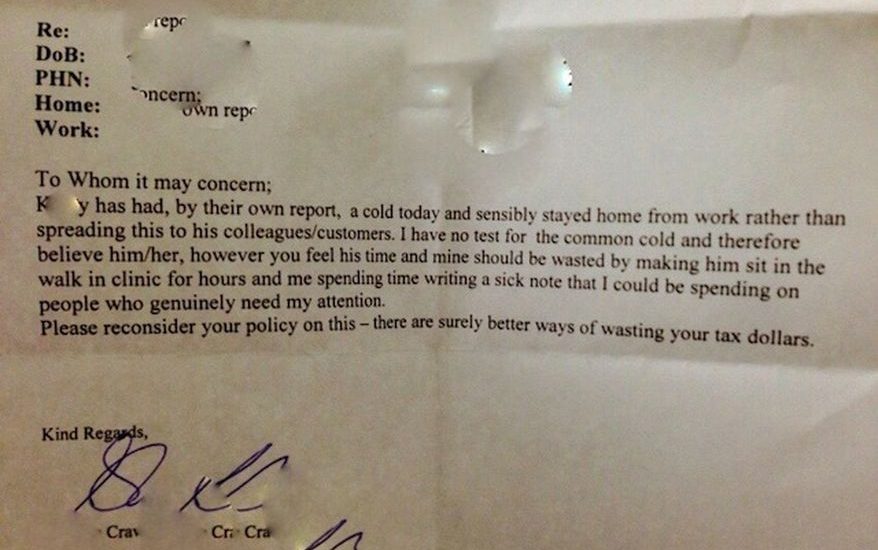
KJIPUKTUK (Halifax) – In Nova Scotia, your boss can demand proof that you’re sick, even if it’s just a short term illness. Those requests make life miserable for workers and put stress on an already overburdened medical system.
For many short-term sicknesses, a trip to the doctor is really not necessary. To recover from a common cold, for example, a couple of days’ rest, soup, and over-the-counter medication may be all that is needed. To satisfy an employer’s request for medical documentation, an unwell worker is forced out of bed and into a medical office, exposing both themselves and the public to unnecessary health hazards.
A recent report, A Rising Tide To Lift All Boats, by the Nova Scotia chapter of the Canadian Centre for Policy Alternatives (CCPA) suggests that the government regulates this practice. Rebecca Casey, the author of the report and Assistant Professor in the Department of Sociology at Acadia University, says that employers who demand sick notes for brief illnesses are exposing their employees to medical and financial risks, and may be breaching their privacy as well.
See also: Nova Scotia labour standards not keeping pace, report suggests
“When the sole purpose behind a medical appointment is to satisfy an employer’s administrative need, the appointment offers no real health value to the patient,” says Casey. “The doctor is merely responsible for ensuring that the employee isn’t punished for being sick, or that he or she receives any sick pay they are entitled to.”
In these situations, it is also unclear what real value these notes have to an employer. “The notes are used to confirm that an employee’s illness was, in fact, severe enough to warrant a short-term absence. However, in the case of a flu, a doctor’s note often just verifies that the employee reported flu-like symptoms.” says Katrin MacPhee, labour lawyer and volunteer for both the Halifax Workers’ Action Centre and the Fight for $15 and Fairness campaign. “Trusting the employee becomes a doctor’s responsibility instead of the employer’s, and this seems unfair”.
Workers in Nova Scotia are only entitled to three unpaid sick days, meaning that many employees are already suffering a financial loss due to their illness. The personal (and sometimes financial) cost of obtaining a medical note may further deter a worker from taking the sick leave they are legally entitled to, argues MacPhee. “Going to work may therefore be a more appealing option for some even if it means further compromising their own health and the health of their workplace.”
For doctors, the process of writing a medical note or completing lengthy forms provided by employers can also be tedious and time consuming. For the sake of validating a few sick days, employers are not only inconveniencing their employee, but are burdening medical professionals, all this while Nova Scotia is in the midst of a health care crisis.
“Employers who request these notes are essentially externalizing their own management costs onto our healthcare system as a whole,” says MacPhee.
Some medical professionals are also seeing an increase in the kind of detail employers expect, raising concerns of confidentiality. Patients’ medical charts, for example, are sometimes requested, at times dating back as far as three months.
“These kinds of requests show a sense of entitlement on behalf of the employer, and a disregard for patient privacy,” says Casey. “A patient’s medical record is unlikely to prove that a worker suffered from a cold, but may equip employers with sensitive information that could negatively impact the worker’s employment and expose them to unfair treatment in the future.”
Instead of medical notes, which can be costly for employees and time consuming for doctors, some medical offices provide patients with generic letters that can be picked up in clinic waiting rooms or downloaded online.
These letters simply remind employers that flu and colds are common, and ask that they treat employees with kindness as they recover. “While these notes have been effective in deterring some, others may remain adamant about obtaining official documentation,” says Casey.
In Ontario in 2017, legislation was tabled to stop employers from requesting medical evidence of employees seeking short term medical leave, including medical documentation from a health care practitioner. Unfortunately, this legislation was withdrawn under the Ford government, and employees in Ontario remain vulnerable to these kinds of demands.
“As part of the Fight for $15 and Fairness campaign, the Halifax Workers’ Action Centre is fighting for all workers to have access to more sick days, paid sick days, and an end to sick notes for short-term absences,” says MacPhee. When you’re sick you deserve time to rest and recover without having to jump through these unnecessary hoops.
The Halifax-Workers Action Centre is a not-for-profit committed to improving the lives and working conditions of low-waged and marginalized workers. info@halifaxworkersaction.ca • (902) 221-0755 • www.halifaxworkersaction.ca
With a special thanks to our generous donors who make publication of the Nova Scotia Advocate possible.
Subscribe to the Nova Scotia Advocate weekly digest and never miss an article again. It’s free!



